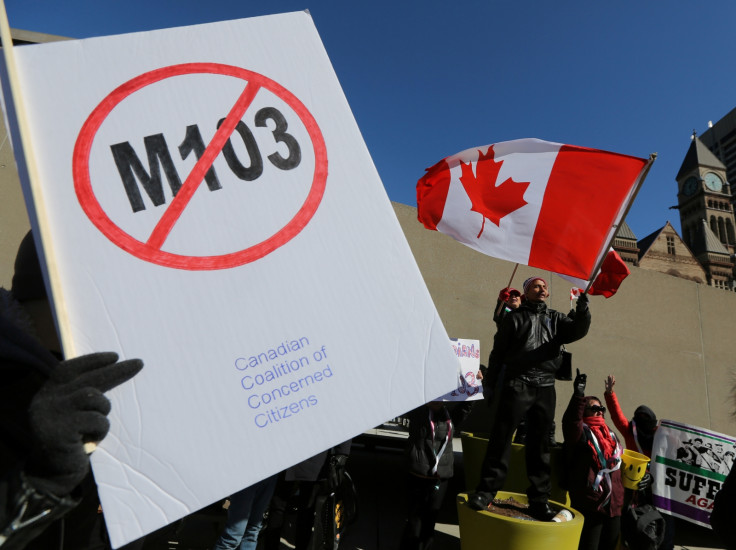Canada passes anti-Islamophobia motion among heated debate and protests
Critics argued motion M-103 stifles free speech and legitimate criticism.
Canada has passed a controversial motion condemning Islamophobia that calls on the government to "quell the public climate of fear and hate".
The non-binding motion, known as M-103, was passed in the country's House of Commons by 201 votes to 91 on Thursday (23 March) following weeks of protests and counter protests.
Those opposed to the motion feared it may curtail free speech and legitimate criticism of Islam, however it received the impetus it needed to succeed following January's shooting in Quebec in which six Muslim men were killed in a mosque .
Iqra Khalid, the Liberal MP who introduced the motion in December, told reporters following the vote: "I think that we need to continue to build those bridges amongst Canadians, and this is just one way that we can do this."
The motion, although largely symbolic, was highly divisive among Canadians and Khalid reportedly received death threats in the lead-up to the vote.
Critics argued that existing Canadian law already has robust anti-discrimination laws and creating additional protections for Islam would only undermine existing legislation.
Conservative MPs attempted to remove the word Islamophobia from the motion and have it replaced with wording to "condemn all forms of systemic racism, religious intolerance and discrimination of Muslims, Jews, Christians, Sikhs, Hindus and other religious communities".
However, Khalid rejected the change stating it would water down the motion's intended effect.
The use of the word Islamophobia itself was also controversial as scientists believe 'phobia' should not be used in the context of Islam.
Jordan Peterson, a professor of psychology at the University of Toronto, among M-103's most vocal critics.
In an interview with Rebel Media, he said: "I think M-103 was ill-advised in a variety of ways. I think it had exactly the opposite effect that it was intended to have.
"The fact that it had the word Islamophobia – which I regard as a reprehensible word. I don't like the word because phobia actually has a technical, medical [and] psychological meaning and that word was appropriated for ideological usage and then applied to any conflict – ideological or emotional – between different identity groups.
"So, it's a crooked word and so whenever it shows up… I'm immediately sceptical of the intent of those who are using the word because it has manipulation build into its structure."
The motion, passed in its original form, also requires Canada's Commons to launch a study on how the government could address Islamophobia and is due to publish its recommendations in November 2017.

© Copyright IBTimes 2025. All rights reserved.






















